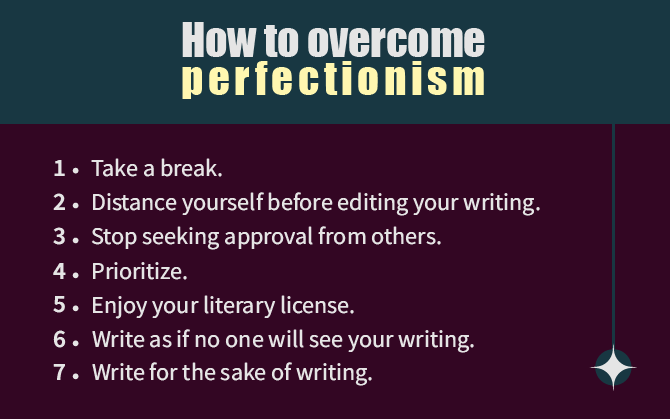7 Tips for Perfectionist Writers
“Hi, my name is Samantha, and I’m a perfectionist writer. They say eighty percent of writing is rewriting. For me, it’s more than 100 percent. I rewrite sentences up to ten times, sometimes more. Ever since I was in high school, I missed deadlines, because I’d rather turn in a perfect essay late, than a lesser one on time. But now the deadlines are serious and my perfectionism is affecting my career.” That was me, years ago.

Sound familiar? Every perfectionist writer has a story or two. We’ve all been there. Writers’ block, procrastinating, anxiety, the trashed drafts that we later lamented. The hours searching for the perfect word to no avail. And after all the painstaking suffering, it’s usually the final draft that we like best, but not always. Is our perfectionism making us better writers or holding us back? Friend or Foe?
So, what should we do? Would it be better to write faster but with shortcuts and compromises? Or would it be better to take your time and write a good piece without rushing to the finish line? Is perfectionism in writing a good thing or is it a plague that needs to be dealt with? So how do we know that the perfectionism has gone too far and needs to be dealt with? And if we know we have a problem, how do we change it?
Being a Perfectionist Writer
What does it actually mean to be a perfectionist writer? Writers take time to write anything, be it a novel or a short story or an article. The amount of time that passes between drafts can indicate whether or not a writer is a perfectionist. A writer that genuinely cares about his work will always find flaws and try to fix them. By fixing a single flaw, they can sometimes find three more errors which can start an avalanche of revisions. Although they are often unneeded, some of the rewrites can actually save a written piece from being unpublished. “Knowing the difference between good and bad writing is often impossible and writers naturally stress over it. This is what it means to be a perfectionist writer,” shares Kairon Hilton, content editor at FlyWriting.
Editors, of course, love reading manuscripts from perfectionists: fewer mistakes, fewer revisions. But there are times when being a perfectionist can affect the productivity of the writer and take a toll on the editors working with perfectionists.
When Perfectionism is a Problem
The fact that you’re reading this post indicates that you probably have some perfectionist tendencies. If you find yourself answering yes to these questions, then your perfectionism is keeping you from being your best self and writer.
Has it affected my perception of myself?
It’s normal to find mistakes in our writing. But do you judge yourself based on these mistakes? If your perfectionism is affecting your view of yourself negatively, then try to redirect your thoughts, before the thoughts lead to depression.
Is it resulting in procrastination?
Are you a procrastinator? Procrastination is an indicator of perfectionism. Most perfectionists are in fact procrastinators. Do you find yourself postponing writing, for the perfect moment, for the perfect thought, for the perfect words, so that you’re writing will be perfect? But then don’t write a word unless the deadline is approaching?
Is it affecting my productivity?
This is probably one of the most common workplace problems. Companies want higher efficiency and higher productivity. Perfectionists want everything done the best it can be done. Conflict sometimes arises. Sadly, the one aiming for perfection is on the losing end of the argument.
Is my quest for perfection keeping me from completing my writing?
Have you stopped writing altogether? Given up on yourself entirely? Started many times, but felt so disappointed in yourself, that you couldn’t continue?
How to Overcome Perfectionism
These are the best tips I’ve gathered over the years, some from famous writers, some from other perfectionists. They’re also the ones I return to when I feel myself relapsing. It’s hard to admit the hard truth that there is no perfect writing in this world. Ultimately, you are the only one who can control the habit–no one else can do that for you.
1. Take a break.
The love and care you put in your writing can sometimes backfire and leave you unable to finish writing. Writer’s block or mild depression can often ensue as a result of striving for perfection. To help you deal with that, you should go for a walk, enjoy a movie, play a game or simply read your favorite author’s new book.
2. Distance yourself before editing your writing.
It’s always a good idea to distance yourself from your writing. Whether you are about to review your writing or simply format it, take a break beforehand. Being objective about your work is important if you want to avoid perfectionist tendencies.
The change of perspective can help you steer thoughts to a more positive outlook. If you do suffer from perfectionism, make sure to use it in a smart way instead of letting it slow you down. There is such a thing as positive perfectionism, but it does require you to distance yourself from what you have created.
3. Stop seeking approval from others.
Robert Louis Stevenson was going to burn The Strange Case of Dr. Jekyll and Mr. Hyde because his wife thought it was “utter nonsense.”
Every writer is criticized. Appeasing every reader is impossible, and you should stop seeking approval from others. If there is someone highly critical of writing, read up on how to deal with criticism as a writer.
4. Prioritize.
Is writing the perfect word more important than meeting the deadline? Is it more important than spending time with your loved ones? Is it more important than taking your dog for a walk? Usually, you’ll find the punctilious habit is verging on pedantic.
5. Enjoy your literary license.
Chalk up your mistakes to literary license and move on. E.E. Cummings’ poetry is most remembered for breaking free from literary convention. Cut yourself some slack and enjoy your literary license.
6. Write as if no one will see your writing.
Most successful writers simply write for themselves or for their loved ones. They shut off the thought that their writing might be read by thousands of readers.
“It puts unnecessary pressure on you that you cannot deal with in long-term perspective. It is also one of the most influential reasons why writers develop perfectionist syndrome and stop writing altogether,” warns Cecil Hickman, a managing editor for TheEssayTyper blog.
7. Write for the sake of writing.
This gem I learned my high school English teacher, who in turn learned it from Maya Angelou. When you feel you can’t write, write anyway. In her words, “I may write for two weeks ‘the cat sat on the mat, that is that, not a rat,’… And it might be just the most boring and awful stuff. But I try.” Just write. Write a lot and write every day. One day, you’ll relax and the words will flow again.

For more on how to get more writing done, here are Top 7 Must-Use Productivity Tools for Self-Publishing Authors. As for perfecting your craft, the Writing Process Explained for Non-Writers will give you some good writing tips.
Conclusion
Whether you want to admit it or not, perfectionism is often based on an unjustified fear of disapproval. Writers write to share thoughts and feelings and tend to seek approval, attention, and laurels just like any other artist. Being invisible and uninteresting to the public is one of the worst things that can happen to a writer.
Shutting this thought off is also a difficult task given that it can hinder creativity and positive thoughts. Use perfectionism to your advantage instead – it can help you polish up your writing before sending it to your editor.
In the end, you should write as if no one will see your writing and pour your passion into your work. That is the only way to make the most out of your perfectionist tendencies and turn a dangerous foe into a welcome friend.
Read these posts.
Freelance Writing Niches You Should Consider
8 Strange Habits Well-Known Writers Formed to Write Better
















Thaís Estolano
February 27, 2019So nice! I read this article about apps to writers, and it’s super interesting! https://demonstre.com/7-aplicativos-para-escritores/